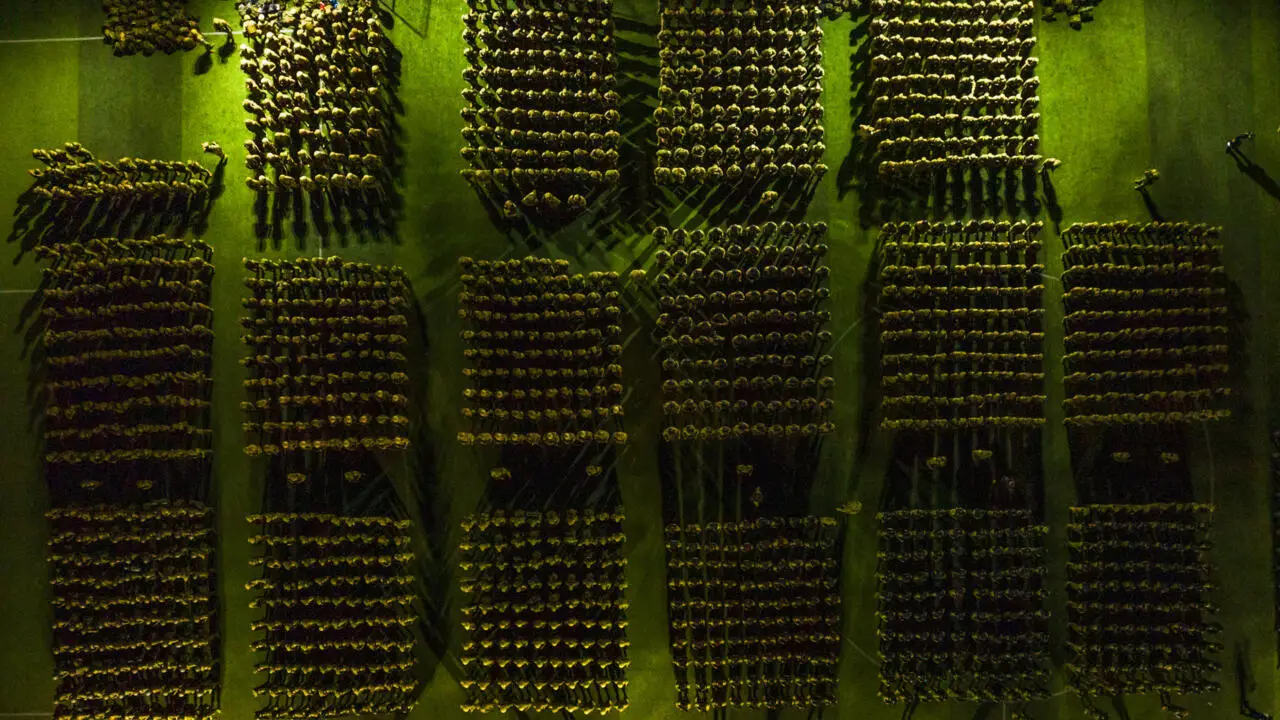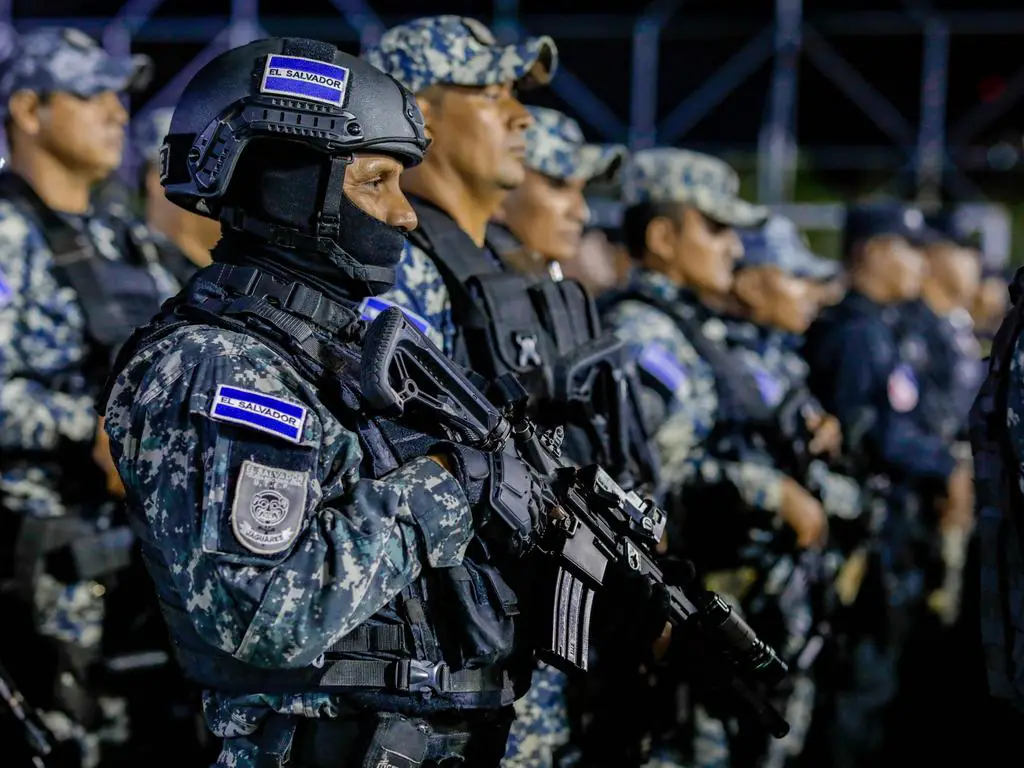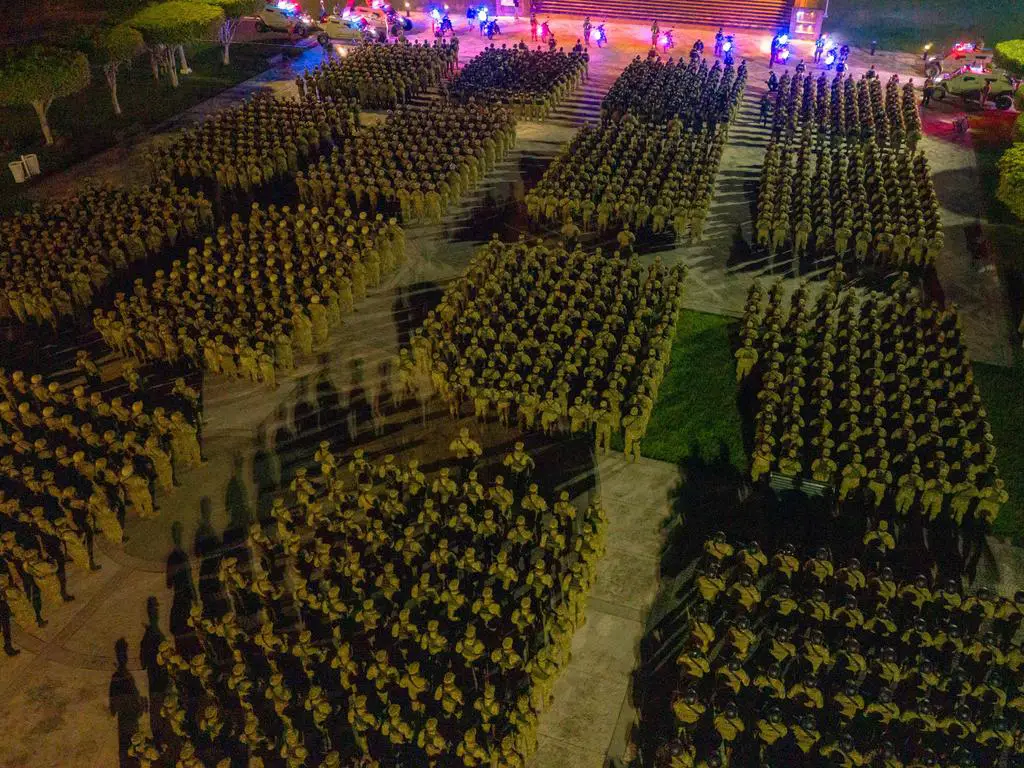In a move that exemplifies his unwavering approach to dismantling organized crime, President Nayib Bukele of El Salvador recently mobilized a massive security force in a high-profile mission to “extract every last one” of the gang members entrenched in the country’s neighborhoods. Monday’s operation, involving 2,500 soldiers and police officers, targeted the outskirts of San Salvador, particularly the area of 10 de Octubre, marking a significant escalation in El Salvador’s long-standing battle with gang violence. With tactical maneuvers, heavy arms, and stringent security checks, the Salvadoran government seeks to purge these violent groups from the nation’s streets entirely.
El Salvador’s approach has sparked intense debate across international forums. Bukele’s administration is vocal in its commitment to purge gangs at all costs, while human rights organizations and international observers raise concerns about potential abuses and civil rights violations.
El Salvador has been in a state of emergency since March 2022. At this crossroads, the promise of safety vies against the principles of individual freedom.
The Evolution of Gang Violence in El Salvador
To fully grasp the implications of El Salvador’s recent operation, it’s essential to understand the historical background and complexity of the country’s gang problem. Gangs such as Mara Salvatrucha (MS-13) and Barrio 18—two of the most infamous criminal organizations—have their roots partly in the Salvadoran diaspora of the 1980s, a period when civil conflict pushed Salvadorans to emigrate, particularly to the United States. Many young Salvadorans grew up in communities with limited opportunities and joined gangs for protection, only to return to El Salvador in the 1990s and 2000s, bringing violent gang culture with them.
Over decades, gang violence evolved from territorial skirmishes into a widespread organized network that thrives on extortion, drug trafficking, and intimidation. Today, Salvadoran gangs wield immense power, using fear to maintain a stranglehold over communities and heavily influencing daily life for many Salvadorans. As the country witnessed skyrocketing murder rates, extortion, and abductions, the government found itself grappling with how to tackle an enemy entrenched within its society. Bukele’s administration has opted for a militarized and controversial approach, defining it as an outright war against gangs.

In response to years of unchecked gang violence, President Bukele declared a state of emergency in March 2022. This gave the government broad powers to detain suspects without warrants, among other concessions, fundamentally reshaping the country’s security policies. Since then, mass arrests have become a common sight, with thousands of suspected gang members detained, often based on suspicion alone.
The recent operation on Monday marks one of the largest deployments to a single neighborhood. The choice of 10 de Octubre is emblematic; according to Defense Minister Rene Francis Merino, there were “indications that these criminals want to establish themselves” in this neighborhood. In executing this operation, soldiers cordoned off the entire area, stopping individuals for identity checks and conducting searches to detain those suspected of gang affiliation.
Images of the event released by the Salvadoran government depict scenes more akin to a battlefield than a residential neighborhood: streets lined with heavily armed troops, helicopters hovering, and residents being asked to present identification in an area temporarily transformed into a quasi-military zone. These measures, according to Justice and Security Minister Gustavo Villatoro, are designed to not only arrest criminals but also dismantle the economic lifelines that sustain gang operations.
Public Perception: Security vs. Freedom
Public opinion in El Salvador is largely polarized. Many Salvadorans who have grown tired of living under the shadow of gang violence express strong support for Bukele’s methods, even as human rights concerns mount. The sense of relief residents feel in certain areas where crime has visibly decreased is palpable, and for many, the price of personal freedoms seems a small sacrifice for security.
In communities where gangs once dictated everyday decisions—such as which routes to take, where to shop, or whether to allow children to attend school—the visible presence of security forces offers a reprieve. Bukele’s supporters argue that he has done more in a short time than previous administrations achieved in decades. According to recent polls, a significant portion of Salvadorans remain supportive of his anti-gang policies, viewing his administration’s crackdowns as a necessary step to reclaim public spaces.

However, critics argue that this approach not only violates constitutional rights but also risks creating a cycle of violence. Human rights advocates and opposition politicians point to instances of wrongful detentions, abuse by security forces, and a lack of legal recourse for those detained. Families of detainees have often reported difficulty obtaining information on the whereabouts of their loved ones, some of whom have been imprisoned without formal charges. Critics argue that this “iron fist” policy, while impactful in the short term, risks perpetuating resentment and disillusionment among the Salvadoran youth, potentially fueling future cycles of violence.
El Salvador’s anti-gang strategy has drawn both criticism and admiration internationally. Neighboring countries, many of which are similarly plagued by gang violence, view Bukele’s decisive actions as an intriguing model. However, organizations like Amnesty International and Human Rights Watch have voiced concerns over the implications for civil liberties and human rights.
The mass arrests and use of military force in civilian neighborhoods have led to reports of abuse. Some detainees allege they were arrested solely based on appearance or due to the area they live in. As international watchdogs call for greater oversight, Bukele has dismissed external criticism as interference, asserting that foreign entities cannot fully understand the reality faced by Salvadorans.
The international community’s concerns are not solely humanitarian. Observers worry that the erosion of democratic norms could set a precedent, creating a ripple effect throughout Latin America. As democratic backsliding becomes a more pressing issue across the region, Bukele’s bold and controversial methods have reignited debates about the balance between security and democracy in societies grappling with violence and lawlessness.
Challenges and Potential Risks
While the immediate outcomes of Bukele’s approach might appear promising, the long-term viability of his policies remains uncertain. To truly dismantle gang networks, it is not enough to remove members from the streets temporarily; the socioeconomic conditions that lead to gang affiliation must also be addressed. High unemployment rates, limited educational opportunities, and a lack of infrastructure in poor communities are major factors that push young people toward gang life. Without addressing these root causes, there is a risk that any success achieved through militarized tactics will be short-lived.

Moreover, this approach places significant strain on El Salvador’s already stretched criminal justice system. Prisons are nearing capacity, and legal backlogs are growing, putting further pressure on a system struggling to process an influx of detainees. Reports of overcrowding and poor conditions within detention centers add fuel to critics’ arguments that these policies merely shift the problem out of public view without addressing underlying issues.
A militarized solution also leaves El Salvador vulnerable to escalation, as gang members may retaliate in increasingly violent ways. Security analysts warn that gang members could resort to guerrilla-style tactics, creating a scenario that risks extending the conflict rather than resolving it. For a country that has already endured civil conflict within living memory, the potential for spiraling violence is a deeply troubling possibility.
As El Salvador continues its unprecedented anti-gang campaign, it faces a pivotal juncture. While Bukele’s approach is undoubtedly reshaping the security landscape, questions remain about what will come next. The government has hinted at plans to launch social programs focused on rehabilitation and reintegration of former gang members, as well as education and job training initiatives in marginalized communities. However, for these plans to materialize effectively, they require sustained investment and a commitment to reforming the systemic issues that gangs exploit.
Observers argue that the government should consider adopting a more multifaceted approach. A combination of preventative measures, such as expanding educational and economic opportunities, and a more targeted enforcement approach could help alleviate some of the underlying tensions fueling gang involvement. Such strategies may offer a pathway toward lasting peace in El Salvador, transforming a war on gangs into a movement for societal change.
El Salvador’s fierce crackdown on gang violence encapsulates a profound struggle: the desire for security in the face of extreme danger versus the need to uphold democratic principles and human rights. President Nayib Bukele’s campaign against gangs is ambitious, embodying the frustration and desperation of a nation worn down by decades of violence. However, as El Salvador undertakes one of the most aggressive anti-gang campaigns in recent history, it stands as a powerful case study on the complex interplay between safety, justice, and freedom.
The operation to “extract every last one” is a critical chapter in El Salvador’s ongoing battle with gang violence. The ultimate question remains: Can El Salvador truly eradicate its gang problem without sacrificing the very rights and liberties it seeks to protect?



